
Parasites Hosts and Diseases
Scope & Guideline
Transforming Understanding of Parasitic Diseases
Introduction
Aims and Scopes
- Parasite Biology and Ecology:
Research on the life cycles, behavior, and ecological interactions of various parasites, including protozoa, helminths, and ectoparasites. - Host-Parasite Interactions:
Studies investigating the mechanisms of infection, host immune responses, and the co-evolution of hosts and parasites. - Molecular and Genetic Studies:
Molecular biology and genetic analyses of parasites, including genome sequencing, gene expression, and the identification of virulence factors. - Epidemiology and Public Health:
Research addressing the prevalence, transmission dynamics, and control strategies of parasitic diseases, with a focus on their impact on human and animal health. - Novel Therapeutics and Vaccines:
Development and evaluation of new therapeutic agents and vaccine candidates against parasitic infections. - Environmental and Ecological Impact:
Explorations of how environmental factors influence the distribution and impact of parasites on host populations.
Trending and Emerging
- Immunological Responses to Parasitic Infections:
An increasing number of studies focus on the host's immunological responses to parasites, exploring mechanisms of immune evasion and the development of immunity. - Molecular Epidemiology:
There is a growing emphasis on the molecular epidemiology of parasites, particularly in understanding genetic diversity and drug resistance in pathogens like Plasmodium and Toxoplasma. - Vector Biology and Control:
Research on vectors of parasitic diseases, including ticks and mosquitoes, is gaining prominence, reflecting the need for effective control measures against vector-borne diseases. - Environmental Influences on Parasite Dynamics:
Emerging studies are examining how environmental changes, including climate change and urbanization, affect parasite transmission and host interactions. - Novel Therapeutic Approaches:
There is a trend towards exploring new therapeutic strategies, including the development of vaccines and alternative treatments against resistant strains of parasites.
Declining or Waning
- Historical Parasitology:
Research related to ancient and historical parasitic infections has become less frequent, possibly due to a shift towards contemporary epidemiological studies and molecular analyses. - Basic Morphological Studies:
Basic studies focused solely on morphological characteristics of parasites are declining as the field increasingly emphasizes molecular and genetic approaches. - Non-infectious Disease Associations:
Investigations linking parasites to non-infectious diseases, while still relevant, appear to be less prevalent as the journal shifts towards direct studies of infection and immune response.
Similar Journals
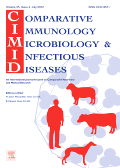
COMPARATIVE IMMUNOLOGY MICROBIOLOGY AND INFECTIOUS DISEASES
Fostering Collaborative Insights in Veterinary SciencesComparative Immunology Microbiology and Infectious Diseases, published by Elsevier Science Ltd, is a prominent journal dedicated to advancing the fields of immunology, microbiology, infectious diseases, and veterinary sciences. Established in 1978, this journal has become a vital resource for researchers and professionals alike, with a commendable impact factor that reflects its significance in academia. The journal, available in both print and electronic formats (ISSN: 0147-9571, E-ISSN: 1878-1667), stands out for its commitment to disseminating innovative research findings, particularly through its categorization in Q2 and Q3 quartiles across various related disciplines as of 2023. The journal aims to provide insightful comparative analyses that enhance our understanding of host-pathogen interactions, immune responses, and disease manifestations. With a global readership base, it serves as a platform for collaborative discourse among scientists and professionals, ultimately contributing to the improvement of health outcomes worldwide.
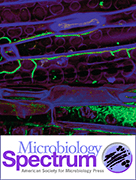
Microbiology Spectrum
Connecting researchers to the spectrum of microbial knowledge.Microbiology Spectrum is a prominent peer-reviewed journal published by the American Society for Microbiology, dedicated to advancing the field of microbiology through the dissemination of high-quality research. Since its inception in 2013 and continuing until 2024, the journal has established a strong presence in key domains such as microbiology, immunology, cell biology, and ecology, achieving impressive quartile rankings including Q1 in Infectious Diseases and Q1 in Immunology and Microbiology as of 2023. With an emphasis on open access to its scholarly content, Microbiology Spectrum aims to foster collaboration and knowledge sharing among researchers, professionals, and students alike. The journal's scope encompasses a diverse range of topics pertinent to the field, making it an essential resource for anyone involved in microbiological research and its applications. Researchers looking to publish their findings in a respected journal will find Microbiology Spectrum's robust impact factor and Scopus rankings serve as testament to its significance and influence within the academic community.
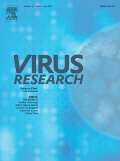
VIRUS RESEARCH
Advancing the frontiers of virology research.VIRUS RESEARCH is a leading journal dedicated to the field of virology, published by Elsevier, and has been a cornerstone for researchers, professionals, and students since its inception in 1984. With an impressive impact factor, the journal is highly regarded, holding a Q2 category ranking in both Cancer Research and Infectious Diseases, as well as in Virology for 2023. Based in the Netherlands, it publishes high-quality, peer-reviewed articles that explore the intricate relationships between viruses and their hosts, novel therapeutic strategies, and advancements in virus biology. Researchers will find that it ranks 49th in Medicine - Infectious Diseases and 19th in Immunology and Microbiology - Virology according to Scopus, signifying its significant contribution and relevance in the academic world. VIRUS RESEARCH facilitates a platform for sharing groundbreaking discoveries, forming a vital part of the global scientific community, making it an essential read for those involved in the study of viral pathogens and their implications in medicine and biochemistry.

ACTA PARASITOLOGICA
Bridging Knowledge Gaps in ParasitologyACTA PARASITOLOGICA, published by SPRINGER INT PUBL AG, stands as a pivotal journal within the field of Parasitology, boasting an ISSN of 1230-2821 and an E-ISSN of 1896-1851. Based in Germany, it has been providing valuable insights and research contributions since its inception, with publishing years converging from 1992 to 1994 and consistently from 1996 to 2024. The journal is recognized in the 2023 Category Quartiles as Q3 in Parasitology, indicating its significant impact and growing influence in the discipline, reflected in its Rank #43/79 in the Scopus Ranks for Immunology and Microbiology (Parasitology). Although not currently available in an Open Access format, ACTA PARASITOLOGICA remains a critical resource for researchers, professionals, and students alike, serving as a platform for the latest developments, methodologies, and discoveries in parasitic research. Its ongoing commitment to advancing the understanding of parasitic diseases and their impact on health and ecosystems underscores its importance in both academia and public health.

VIROLOGIE
Unraveling the mysteries of infectious diseases.VIROLOGIE is a prominent international journal dedicated to advancing the field of virology and infectious diseases, published by John Libbey Eurotext Ltd. Since its inception in 1997, this journal has provided a platform for researchers and professionals to disseminate their findings on various aspects of virology, including the pathogenesis, epidemiology, and treatment of viral infections. Despite its current ranking in Q4 for both Infectious Diseases and Virology categories, the journal remains a valuable resource for emerging research and novel insights. The ISSN for the journal is 1267-8694, and it is based in France. VIROLOGIE is committed to upholding rigorous academic standards and fosters an inclusive scholarly community, making it an essential read for those pursuing knowledge and advancements in the ever-evolving landscape of virology. While the journal does not currently offer open access options, it continues to contribute significantly to the global discourse on viral research through its diverse range of published studies.

SYSTEMATIC PARASITOLOGY
Advancing the frontiers of parasitological research.SYSTEMATIC PARASITOLOGY, a premier academic journal published by Springer, serves as a vital resource in the field of parasitology. Since its inception in 1979, this journal has committed itself to advancing the understanding of parasitic organisms and their interactions with hosts, thus playing a significant role in both basic and applied research. With an impactful contribution to the scientific community—evidenced by its Scopus ranking and its position in the third quartile (Q3) within the Parasitology category—the journal provides a platform for high-quality, peer-reviewed research that spans a variety of topics from molecular biology to ecology. Although not currently open access, SYSTEMATIC PARASITOLOGY remains essential for researchers, professionals, and students who seek to stay at the forefront of parasitological studies and contribute to ongoing developments in the domain. Published in the Netherlands, it continues to attract a diverse international readership, fostering a collaborative scientific environment.

Frontiers in Virology
Pioneering Discoveries in Viral PathogenesisFrontiers in Virology, published by FRONTIERS MEDIA SA, is an innovative open-access journal dedicated to advancing the understanding of viral biology, pathogenesis, surveillance, and control strategies. With the rapid evolution of viral threats, this journal serves as a critical platform for researchers, professionals, and students to disseminate and access high-quality research, reviews, and perspectives in virology. The journal places a strong emphasis on interdisciplinary approaches, promoting collaborative efforts that drive breakthroughs in the field. While the specific impact factor and H-index details are currently unavailable, Frontiers in Virology is committed to rigorous peer review and integrity in scientific publishing. Authors and readers will benefit from the extensive reach provided by open access, making groundbreaking insights available to a global audience, thus contributing significantly to the ongoing dialogue in virology and public health.

JOURNAL OF HELMINTHOLOGY
Unraveling the mysteries of helminth parasites.JOURNAL OF HELMINTHOLOGY, published by Cambridge University Press, has been a pioneering platform for the dissemination of research in the field of helminthology since its inception in 1923. With a notable focus on animal science and parasitology, this journal holds a distinguished position in the academic landscape, attaining Q2 status in Animal Science and Zoology and Q3 in both Medicine (miscellaneous) and Parasitology as of 2023. The journal aims to advance the understanding of helminth parasites, their epidemiology, and the myriad implications for human and animal health. Access to this esteemed journal is currently non-open, enabling a curated and high-quality review process that enhances the academic rigor seen in its publications. Residing in the United Kingdom, the JOURNAL OF HELMINTHOLOGY serves as a vital resource for researchers, professionals, and students alike, fostering a community dedicated to combating the challenges posed by helminth infections globally. With its rich history and commitment to excellence, the journal continues to contribute significantly to the fields of parasitology and beyond.
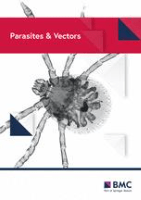
Parasites & Vectors
Exploring the intersection of science and public health.Parasites & Vectors is a leading open access journal dedicated to the dissemination of high-quality research on the vectors of infectious diseases and their parasitic agents. Published by BMC in the United Kingdom, this journal has been at the forefront of its field since its establishment in 2008, contributing to our understanding of vector-borne pathogens through its rigorous peer-reviewed articles. With a notable impact factor and categorized in the top quartile (Q1) in both Infectious Diseases and Parasitology, it is an essential resource for researchers, professionals, and students worldwide. The journal ranks impressively within various categories, holding a position of 7th out of 194 in Veterinary General Veterinary and 12th out of 79 in Immunology and Microbiology Parasitology, indicating its significant contribution to the sciences. Accessible to all, Parasites & Vectors supports the global pursuit of knowledge in epidemiology and disease control, making it an indispensable platform for sharing innovative findings and fostering collaboration within the scientific community.
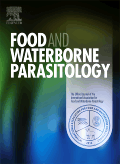
Food and Waterborne Parasitology
Innovating Solutions for Global Health ChallengesFood and Waterborne Parasitology is a premier open-access journal published by ELSEVIER, dedicated to the critical study of parasites affecting food and water safety. Since its inception in 2015, the journal has significantly contributed to research in the fields of epidemiology, food science, and parasitology, achieving impressive rankings in its categories with a Q1 status in Food Science and a Q2 in both Epidemiology and Parasitology as of 2023. Addressed from RADARWEG 29, 1043 NX Amsterdam, Netherlands, it garners attention for its accessible content, aiming to elevate the understanding of the impact of parasitic organisms on public health and food security. With its open-access model, the journal enhances visibility and dissemination of research findings, fostering collaboration and innovation among researchers, professionals, and students alike. By bridging scientific inquiry with practical applications, Food and Waterborne Parasitology plays a pivotal role in addressing global health challenges and advancing knowledge in this vital area of study.